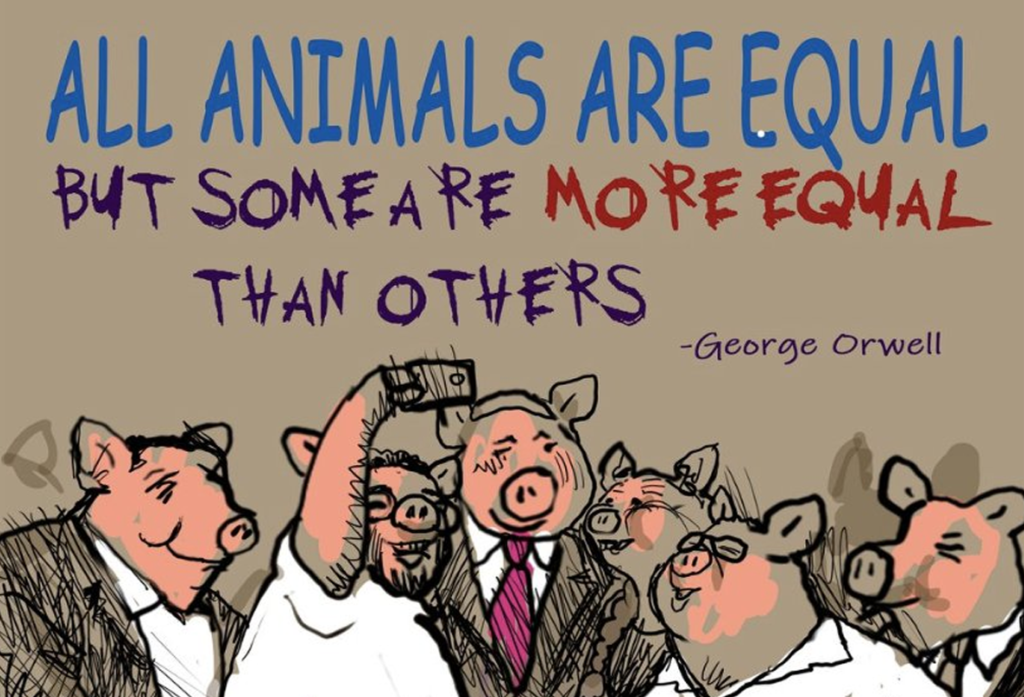In the dynamic political terrain of Ghana, recent events involving the New Patriotic Party (NPP) have drawn striking comparisons to George Orwell’s renowned novel, “Animal Farm.”
Just as the pigs in Orwell’s allegory consolidated power and strayed from the ideals of the animal revolution, the NPP’s actions in the Ghanaian parliament have raised significant concerns about their dedication to democratic principles and the rule of law.
The NPP’s governance, characterized by a proclivity for manipulating parliamentary procedures, has uncannily mirrored the pigs’ abuse of power in “Animal Farm.”
The party’s recent efforts to unseat several National Democratic Congress (NDC) parliamentarians, notably James Gyakye Quayson and Dr. Cassiel Ato Forson, have faced widespread criticism as clear endeavors to undercut the opposition and solidify their own political authority.
In the case of Mr. Quayson, the NPP-dominated parliament sought his removal based on a technicality despite his legitimate election by his constituents. This move was widely viewed as a strategic maneuver to shift the balance of power in their favor, resembling the pigs’ manipulation of regulations to maintain control.
Likewise, the NPP government’s pursuit of legal action against Dr. Forson triggered broad condemnation.
The justification provided, citing procurement irregularities in which the MP was allegedly involved as a former Deputy Finance Minister acting on directives, was perceived as a calculated tactic to weaken the opposition and ensure their stronghold on the legislative front.
Although initially successful in ejecting Mr. Quayson from parliament for almost two years, the NPP faced a reversal when three NPP and one NDC parliamentarians had their seats declared vacant after defecting to independent candidates.
The public interpreted the NPP’s subsequent appeal to the Supreme Court as a desperate bid to maintain their numerical superiority in parliament.
These incidents have not eluded the Ghanaian electorate, who, akin to the animals in Orwell’s narrative, have shown a clear grasp of the unfolding dynamics. The public has rebuked the NPP’s actions as a blatant disregard for democratic representation and the people’s will.
The public has stood as vigilant referees in this political narrative, discerning any partiality in the game orchestrated by the NPP-dominated parliament and judicial system.
They have detected the NPP’s maneuvers to sway the parliamentary proceedings in their favor through technical manipulations.
The NPP’s parliamentary advantage posed a significant challenge, prompting them to resort to various strategies to uphold their authority, including expelling Mr. Quayson and targeting Dr. Forson. However, Ghanaian citizens have showcased their refusal to be passive bystanders in this political saga.
The public has pledged to employ a “technical knockout” approach, rejecting the NPP’s schemes. They demand a fair and transparent process that respects popular will and democratic principles.
The lingering question among Ghanaians revolves around the recruitment of experts for parallel collation by the Electoral Commission, reflecting a deep-rooted mistrust stemming from the NPP’s actions and perceived attempts to deceive the public.
The parallels observed between the NPP’s governance and the narrative in “Animal Farm” are evident. The gradual shift of the pigs from revolutionary leaders to authoritarian figures resonates with the NPP’s endeavors to consolidate power and undermine opposition.
The disillusionment felt by the public mirrors the animals’ realization that their revolution fell short of its ideals.
As Ghanaians navigate this political landscape, they must maintain vigilance and steadfast commitment to democracy. Lessons from “Animal Farm” serve as a stark caution against unchecked authority and ideal betrayal.
Ghanaians must protect their cherished freedoms and ensure equitable representation, safeguarding them from the NPP’s power-seeking pursuits.
The triumph of the NDC signifies not only the party’s success but a victory for the entire nation. Ghanaians have demonstrated their ability to stand up to the occasion when necessary.
By Innocent Samuel Appiah


